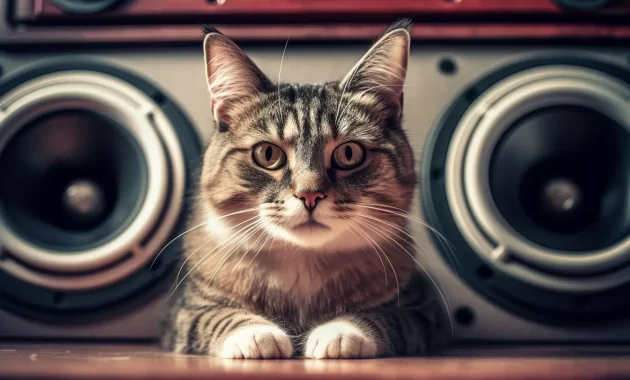
Cats are mysterious creatures that have captivated humans for centuries.
They are known for their independent nature, playful antics, and curious personalities.
But have you ever wondered if cats enjoy music?
It’s a question that has been asked time and time again, with many cat owners wondering whether their furry friend is tapping its paw along to the beat or simply ignoring the sound altogether.
While it may seem like a trivial question, understanding whether or not cats like music can tell us more about these fascinating animals.
So we did some digging and spoke to experts in animal behaviour to find out what they had to say about this topic.
From classical to heavy metal, here’s everything you need to know about whether your feline friend is a music lover.
The Science Of Feline Hearing

The Feline Auditory System is a fascinating topic, as cats have an exceptional ability to hear sounds that are beyond human perception.
Their ears can move up to 180 degrees, allowing them to accurately locate the source of sounds.
Additionally, they have about 20 muscles in their ears that help them detect and amplify noises.
Cats’ Sound Perception is also unique.
They can pick up frequencies much higher than humans, making certain types of music unpleasant.
Loud or high-pitched sounds may even cause discomfort or anxiety for felines.
However, classical music or calming melodies might be more enjoyable for cats.
Understanding the intricacies of the Feline Auditory System and Sound Perception is crucial when considering whether cats enjoy music.
While it’s clear that not all types of music will appeal to our feline friends, some genres could soothe and entertain them.
So if you’re a cat owner who loves to listen to music, it might be worth experimenting with different styles and observing your cat’s reactions!
SEE ALSO
Here’s The Best Time To Spay Or Neuter Your Cat
Do Cats Remember People? All Signs Point To Yes
Understanding Cats’ Responses To Sound

Now that we’ve explored the science behind feline hearing let’s delve into the fascinating topic of cats and music.
While studies have shown that cats can hear a wide range of frequencies and have an acute sense of hearing, researchers are still trying to understand their musical preferences.
Feline musicality is a subject that has gained interest in recent years.
Some experts suggest that cats may be drawn to certain types of music, particularly those with calming tones and rhythms.
This has led to the development of ‘meow sic therapy,’ where music is used to help soothe anxious or stressed cats.
However, not all cats respond positively to music.
Some may become agitated or ignore it altogether.
Cat owners need to pay attention to their pet’s reactions when playing music and adjust accordingly.
Ultimately, whether or not a cat likes music depends on the animal’s unique personality traits.
With further research, we may better understand how music affects our feline friends.
In the meantime, it’s worth exploring different types of music and observing your cat’s response.
Who knows? You may discover new tunes you and your furry companion can enjoy together!
Music Preferences In Cats

While cats may not be able to communicate their musical preferences, research has shown that they do have a response to music.
A study by the University of Wisconsin-Madison found that cats responded positively to classical music but did not respond as strongly to other genres, such as pop or heavy metal.
This suggests that cats may have a preference for specific musical genres.
Behavioural changes in cats have also been observed when music is played.
Slow and calming music has been known to relax cats, while upbeat and loud music can cause them to become agitated or stressed.
Cat owners must pay attention to their pet’s behaviour when playing music and adjust accordingly.
To better understand cats’ musical preferences, here is a table depicting how different genres of music affect their behaviour:
| Musical Genre | Behavioral Response |
|---|---|
| Classical | Positive response, relaxation |
| Pop | Mild response |
| Heavy Metal | Negative response, agitation |
Incorporating calming classical music into a cat’s environment may benefit its well-being and stress.
However, it’s important to note that each cat is unique and may react differently to certain types of music.
As with any new stimuli introduced into a cat’s environment, monitoring their behaviour closely for adverse reactions is recommended.
Understanding how cats respond to different types of music can help improve their quality of life and create a more harmonious living environment between feline companions and their human counterparts.
Observing and catering to our pets’ needs, we can deepen our bond with them and create a loving home filled with beautiful melodies.
The Benefits Of Music For Cats
Just as humans have different music preferences, cats do too.
But even though some cats may seem indifferent to music, there is evidence that suggests that they can benefit from it.
Some experts say that music can be a form of feline relaxation and musical therapy.
Think of cats as people with their unique personalities. Some cats prefer classical music, while others enjoy upbeat rhythms or calming nature sounds.
However, regardless of their preference, studies have shown that certain types of music can help to calm and relax cats in stressful situations.
This is because music can stimulate the release of hormones such as dopamine and serotonin, which can help reduce stress levels in humans and animals.
One potential benefit for cats listening to music is its ability to aid in their recovery from illnesses or injuries.
For example, playing soothing background music during postoperative care has increased healing.
Additionally, musical therapy has been used to improve mood and reduce anxiety levels in sheltered or rescued cats experiencing stress due to their environment.
Incorporating soothing tunes into your cat’s daily routine could benefit its health and well-being.
Whether playing soft instrumental tracks during nap time or calming nature sounds during grooming sessions, introducing music into a cat’s life may provide them with the necessary relaxation.
Tips For Playing Music For Your Cat
When playing music for your feline friend, it’s essential to keep their hearing sensitivity in mind.
Cats have a much more comprehensive range of hearing than humans do, and some sounds that we find pleasant can be irritating or even painful for them.
So before you hit play, ensure the volume is low and the music isn’t too high-pitched.
Classical music is an excellent option if you’re looking for calming music.
Slow-paced instrumental pieces can help soothe your cat and create a peaceful atmosphere in your home.
You can also try playing nature sounds like rainfall or bird calls, which can mimic the sounds cats hear in the wild.
Remember that every cat is unique, so don’t be discouraged if your furry friend initially doesn’t seem interested in music.
Some cats may prefer silence or the sound of white noise instead.
Keep experimenting with different types of music and see what works best for your cat’s preferences.
With time and patience, you’ll find the perfect soundtrack to help your cat relax and unwind.
By remembering these tips and paying attention to your cat’s reactions, you can create a harmonious environment that benefits you and your feline companion.
So press play – who knows, you might discover a new favourite song together!
Frequently Asked Questions
Can Cats Understand The Lyrics Of Songs?
As the old saying goes, music is the universal language of humanity. But can it also be the universal language of felines?
Many cat owners have wondered if their pets can understand the lyrics of songs or if specific musical instruments may affect their behaviour.
While studies have shown that cats respond to music, which can even influence their mood, no evidence suggests that they prefer specific instruments over others.
However, one thing is sure – music has a powerful effect on humans and animals alike, and who knows, maybe your furry friend enjoys jamming out with you more than you think.
Do Certain Genres Of Music Affect Cats Differently?
Music therapy for cats is a fascinating topic that has gained attention recently.
The science behind feline musical preferences reveals that specific genres of music can affect cats differently.
For example, classical music has been shown to have a calming effect on cats, while heavy metal or loud rock music can cause anxiety.
By understanding the impact of music on our feline friends, we can use it to promote relaxation and reduce stress in their everyday lives.
It’s incredible how music can profoundly impact our pets, and it’s just one more way we can connect with them intimately.
Is It Possible To Train A Cat To Like A Specific Type Of Music?
Have you ever wondered if training your cat to like a specific type of music is possible?
While it may seem far-fetched, some experts suggest that cats may prefer music genres.
Studies have shown that cats respond positively to classical music, which can have a calming effect on their mood.
The relationship between music and mood in cats is still not fully understood, but they can be affected by the sounds around them.
So next time you’re playing some tunes at home, why not see if your feline friend has a favourite genre?
Who knows, maybe you’ll discover a new shared interest!
Can Playing Music For Your Cat Have Any Negative Effects?
Playing music for your cat can have potentially harmful effects, such as hearing damage and stress response.
While cats have a different auditory system than humans and may not respond to music similarly, playing loud or intense music can still cause harm to their sensitive ears.
Additionally, particular music or sounds may trigger a stress response in cats, leading to anxiety or aggression.
It’s essential to consider your cat’s preferences and reactions when choosing whether or not to play music for them.
Are There Any Specific Songs Or Artists Known To Be Popular Among Cats?
Cats’ Music preferences vary, but some songs and artists tend to elicit positive feline reactions.
Musical cat therapy has become increasingly popular as pet owners seek to improve their cat’s behaviour and overall well-being.
Some cats enjoy classical music, while others prefer soft rock or specific genres like reggae or jazz.
Not all cats respond positively to music, so paying attention to your cat’s reactions and adjusting accordingly is essential.
Incorporating music into your cat’s environment can positively impact their mood and behaviour.
Do Aegean Cats Respond to Music?
Aegean cat breed information characteristics is fascinating, but their response to music varies. Some Aegean cats seem to enjoy classical music, while others may not react at all. Their individual preferences make it difficult to determine a universal response to music among Aegean cats.
Conclusion
In conclusion, while the jury is still out on whether cats genuinely enjoy music, some indicators suggest they respond positively to certain sounds and rhythms.
Experts agree that cats are sensitive to high-pitched noises and may be soothed by classical or ambient music.
However, it’s important to note that each cat is unique and may have their individual preferences when it comes to music.
That being, playing music for your cat certainly won’t harm them and may even provide entertainment or relaxation for you and your furry friend.
So go ahead and put on some tunes for your kitty – who knows, maybe they’ll start dancing along with you!




